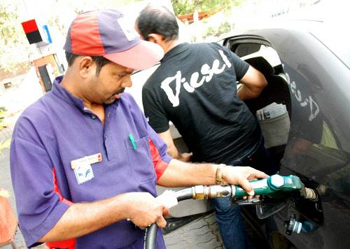New Delhi, Oct 18: In much-awaited reform, the government on Saturday deregulated diesel prices, a move that will result in a price cut of Rs 3.37 a litre with effect from midnight tonight.

As a result, rates will be cut by Rs 3.37 a litre with effect from midnight tonight.
This is the first reduction in diesel rates in over five years. Diesel rates were last cut on January 29, 2009 when they were reduced by Rs 2 a litre to Rs 30.86.
Diesel prices were last raised by 50 paisa on September 1 and cumulatively risen by Rs 11.81 per litre in 19 instalments since January 2013.
There couldn't have been more opportune time for the decision. Oil prices are near a four-year low and two major state elections are out of the way.
Reserve Bank Governor Raghuram Rajan has recently called on the government to "seize this moment", while inflation is the lowest in five years and refiners are selling at a profit for the first time ever.
Brent crude has fallen 25 percent this year to around USD 83 per barrel and expectation is that it may not cross USD 100 barrel anytime soon.
The process was set in motion by the previous UPA government when it eliminated controls on petrol prices in 2010 and in January last year decided to raise diesel prices by up to 50 paisa a litre every month.
The result has been that petrol prices have moved in tandem with global cost and retail rates being reduced on five occasions since August on falling oil rates. Prices have cumulative come down by close to Rs 7 per litre in last two-and-half months.
On diesel, the entire under-recovery or loss has been eliminated and oil firms started making profit from second half of September. The over-recovery or profit has since reached Rs 3.56 per litre.
Deregulation would mean that the government and state-owned explorers including Oil and Natural Gas Corp (ONGC) are no longer subsidising diesel.
Finance Minister Arun Jaitley had budgeted Rs 63,400 crore for petroleum subsidies which was 25 per cent lower than previous fiscal. But unlike past, the subsidy bill is unlikely to overshoot the budgeted amount due to fall in oil rates.
Oil subsidy account for a quarter of Rs 2.51 lakh crore.
Originally, petrol and diesel prices were deregulated in April 2002 when the NDA government was in power. Administered pricing regime, however, made a back-door entry towards the end of NDA regime in the first quarter of 2004 when crude prices started inching up.
The Congress-led UPA controlled rates as international oil prices went through the roof. In June 2010, however, it freed petrol price from its control and rates have since then moved more or less in tandem with cost.
It had in-principle decided to deregulate diesel, which is used in everything from cars and trucks to back-up power generators and agricultural water pumps. The fuel accounts for 43 per cent of the nation's fuel consumption.
In January 2013, the then UPA government decided to deregulate diesel prices in stages through a monthly 50 paise a litre increase. Rates were last hike on September 1 after which losses have been wiped off.
It is estimated that under-recovery or revenue loss on selling diesel, LPG and kerosene at prices lower than imported cost this fiscal will be around Rs 86,080 crore.
This will have to be met by cash subsidy from government as well as dole from upstream oil producers like ONGC.
The under-recovery estimate for the current fiscal is lower than Rs 1,39,869 crore of last fiscal. In 2013-14, the government had provided Rs 70,772 crore by way of cash subsidy while upstream firms picked up Rs 67,021 crore tab.
Sources said the under-recovery in (April-June) was Rs 28,691 crore. This was mostly met by Rs 11,000 crore cash subsidy from the government and Rs 15,547 crore coming from ONGC, Oil India Ltd and GAIL. The remaining Rs 2,144 crore was absorbed by fuel retailers (IOC, BPCL and HPCL).
In second quarter, the under-recovery is estimated at Rs 21,198 crore with diesel accounting for Rs 2,848 crore as compared to Rs 9,037 crore in the June quarter. Kerosene under-recovery was Rs 6,950 crore (Rs 7,524 crore in Q1) and LPG was Rs 11,400 crore (Rs 12,129 crore in Q1).
While diesel losses have been wiped off, oil firms lose Rs 31.22 a litre on kerosene and Rs 404.64 per 14.2-kg LPG cylinder.
Sources said government had provided Rs 1,00,000 crore cash subsidy in 2012-13 when under-recoveries touched an all- time high of Rs 1,61,029 crore. In the preceding year, Rs 83,500 crore was given. Upstream firms had chipped in with Rs 60,000 crore in 2012-13 and Rs 55,000 crore in 2011-12.





Comments
Hi there, just became aware of your blog through Google, and found that it's
truly informative. I'm gonna watch out for brussels.
I'll be grateful iif you continue this in future. Many people will be
benefited from your writing. Cheers!
my web page - self storage hiram ga: http://www.brownbook.net/business/39277916/harry-chesney-llc
Add new comment